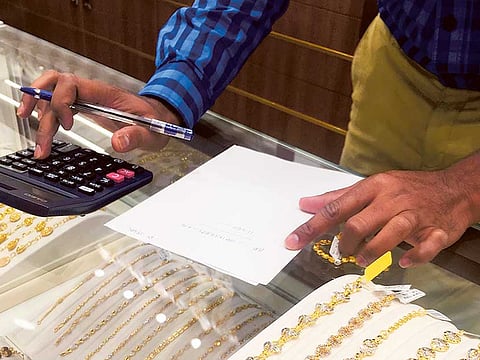Jewellers in Dubai continue to charge swipe fee
Some hike making charges to skirt the rule banning extra charge for credit card payment

Dubai: Small jewellery stores in Dubai continue to charge a swipe fee even after the recent announcement about hefty fines for merchants charging extra for credit card payments.
Gold merchants have been drawing flak for taking a surcharge for credit card payments. The recent announcement from the Ministry of Economy that it will attract fines up to Dh100,000 has not done away with the illegal practice, Gulf News has learnt.
Gulf News visited a number of jewellery stores at different locations in Dubai and found that some charge extra while many others skirt the rule by hiking the making charges for customers using credit cards for their purchases.
“Are you paying by cash or card?” is the first question posed to customers at some outlets so that the employees know how to play with the gold-making charge while calculating the prices.
A salesman at a jewellery shop in Al Quoz Mall said the store charges 2.5 per cent commission for credit card purchases. He said he was not even aware that it is illegal. “We have been taking this charge. I don’t know if there is any new rule that prohibits this,” he said.
At another gold store in Al Quoz, a store manager said they charge 1.9 per cent of the bill as a swipe fee. When it was pointed out that it was illegal, he admitted that they were aware of the matter.
“It’s an issue between us and the banks as banks still charge a fee from us for credit card transactions. If we have a website and a tie-up with banks like the big corporate brands do, the banks will not charge us. We are working on this,” he said and offered to cancel the swipe fee for the purchase.
One jewellery shop in Deira Gold Souq was not giving an option for credit card payment for purchases with “zero making charge.”
“If you use credit card, then you need to pay charge for [items with] zero making [charge]. That is 2.25 per cent. If there is a making charge, then there is no charge on card...because we are giving you [the ornament] on gold price without any margin. It is a scheme. If you want zero making charge, you need to pay by cash,” an employee said.
Some gold shops at Karama Centre, which houses outlets of many Indian jewellery groups, were also found to be charging a swipe fee.
“If you use a card, there will be a difference of only Dh20. If you are paying by cash, we can make some more adjustments,” said a salesman at one outlet.
Fully aware that charging a swipe fee is illegal, he said the stores increase the making charge for gold ornaments when customers use card payment.
“We don’t say it is a charge for the card…Stores can decide the making charge and we hike it if it is a card payment. If customers are paying cash, we sell for cheaper rates.”
A salesman at another outlet in the same shopping centre said, “If it is cash, you will get a better discount,” he said.
For one particular bracelet, he said, a Dh9.5 making charge per gram will be charged if it is cash payment and it will be Dh12.5 per gram if it is card payment.
Employees of some of these stores said some big gold groups also take extra money from customers by fixing their rates high and not allowing customers to go for bargains. However, after making inquiries, some big groups denied this.
Visa statement
Meanwhile, credit card giant Visa said its network participation rules do not allow merchants to charge extra for credit card payments and it is working with banks and companies in the UAE to help abolish the practice.
Mohanish Agni, head of Merchant Sales and Solutions at Visa in the Middle East and North Africa, told Gulf News: “Visa’s network participation rules do not allow surcharging and Visa maintains that the simplest, most economically efficient and pro-consumer policy is for merchants not to surcharge consumers who choose to pay using a card. Visa works with the banks and other companies who provide acquiring services to merchants in the UAE in order to identify and remove the practice.”
—With inputs from Sarah Algethami, Staff Reporter
Sign up for the Daily Briefing
Get the latest news and updates straight to your inbox



